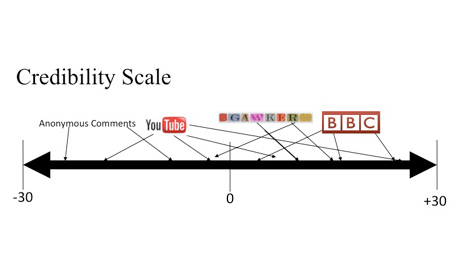Ha! I like this concept …
Writing on The Guardian‘s Comment is free website — Andrew Breitbart and the unwilling suspension of disbelief about the right wing web maven who ‘exposed’ Rep. Weiner — Dan Gillmor referred to his model of ‘negative credibility‘ and included this neat graphic:

Dan Gillmor's credibility scale (or 'BS meter'). Personally I'd put some of the spruikers I discuss here as somewhere left of Anonymous Comments.
Gillmor’s article is worth reading, as, like the erudite j-school prof Jeff Jarvis (@jeffjarvis), he pipes up and admits he misjudged the newsworthiness of the Weiner/twitter/junk shot ‘scandal’. [BTW, admissions of ‘error’ like this (‘I got it wrong‘) actually enhance credibility, in my view. Good on both of them.]
I like Gillmor’s concept: negative credibility — I see it as a state of expectation that someone’s claims are probably false … before they actually make them.
I’m certainly that way — personally — with some of the spruikers I discuss here on www.ThePaepae.com from time to time: remember Sean Wood‘s pose as his own satisfied customer MUFFIT?, or Steve Goodey‘s claim to be ‘a NZ property investing icon‘? (Crikey!) or Sean Stenning‘s hyperbole … don’t get me started, or Dean Letfus … again, just too many ‘Instant Expert’ examples to mention.
Like Gillmor, I feel I can be persuaded that a particular, specific claim has veracity (possibly accidentally?) even from a let’s say ‘dubious‘ source. I try NOT to adopt a ‘no good thing can come from Nazareth’/’poison fruit from a poison tree’ model. But (and it’s a significant but) in my personal view, some people have by their demonstrated track record proven themselves to be … unreliable.
Of course, spelling that conclusion out as I do might hurt their feelings, and while I sympathise at one level, I think that’s just a case of natural consequences or feedback. How do you see it?
– P


Here’s an example of negative credibility in action from the Telegraph re Anthony Weiner’s woes:
http://www.telegraph.co.uk – http://tgr.ph/kv6jPt
Yup. Only this time the Congressmen set fire to his own credibility via a clumsy cover-up attempt. I sympathise, but that was a bad decision.
[…] discussed before Dan Gilmor’s concept of ‘Negative Credibility‘ — the idea that sometimes […]
[…] has its own ‘reward’ and consequences. One of them we’ve discussed before: Dan Gilmor’s concept of ‘Negative Credibility‘ — the idea that information actually has an […]